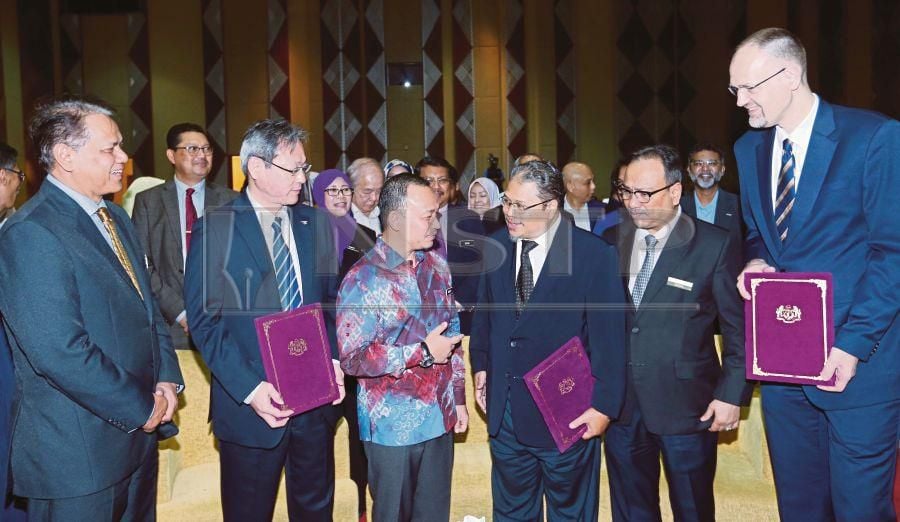
INDUSTRIES should work together with Technical and Vocational Education and Training (TVET) institutions, such as polytechnics, community colleges and vocational schools, to build a new education system.
In a dialogue entitled “Building a brighter talent through TVET”, speakers from the Malaysia Retail Chain Association (MRCA), MMC Corporation Bhd, Malaysian Federation Employers (MEF), International Business Machines Corporation (IBM), and Polytechnic and Community College Education Department (DPCCE) of the Education Ministry concurred that expanding public-private partnerships is crucial in creating a pathway for students to take up TVET courses.
The industry’s role is to provide apprenticeship, while TVET institutions concentrate on teaching and training.
MRCA deputy secretary-general Datuk Bruce Lim Aun Choong said the retail industry should focus on the digital economy and invest in people and technology.
“The success stories are always in startups, which promote entrepreneurship and increase employment. In this new digital economy, TVET graduates can make money if they have the entrepreneur’s mindset.
“For example, they can go into franchising or the food truck business. If two hours of selling food and beverages can generate income, that is good enough.
“They can take pride in ownership and encourage more graduates to join them, thus creating job opportunities.”
He said with around half a million companies in the country, there were lots of job opportunities for fresh TVET graduates.
“I think the retail industry is the best fit. Now is the best time for graduates to join the industry.
“We don’t want anyone who is only capable of serving coffee at the workplace, or a researcher with a PhD, but we need someone with skills to do more than those.”
Instead of blaming polytechnics and community colleges for failure to produce enough TVET graduates, Lim suggested finding ways to get companies to change that mindset.
“If only industry players have the ability to look for ways to grow, then the retail industry would not need to hire foreign workers,” he said.
MMC Corporation Group chief financial officer Mohd Shahar Yope said collaboration between the industry and TVET institutions were important because they ensured a constant supply of manpower.
“At MMC, for example, we help TVET students join the industry. In Johor, we contribute machines to Politeknik Ibrahim Sultan. Students learn how to operate them so that once they graduate, they are familiar with the technology.
“We should also do away with the perception that TVET graduates are just ‘second’ choice compared with their university counterparts.
“For us, TVET graduates are skilled workers entrusted to manage and operate machinery worth millions of ringgit. In fact, with their know-how, they can work anywhere.”
Shahar said it was high time for TVET graduates to be accorded the recognition they deserved, so top school leavers would be encouraged to pursue a TVET education.
Meanwhile, MEF council member Zulkifly Abdul Rahman asked how the industry could mould its future talent.
“Which TVET institution will assist us? How do we create the value in terms of competency? The federation can update TVET institutions with the latest industry demand.
“Many companies already have interns. We understand the budget limitations, but if necessary, these companies can share the cost of training trainees.”
Zulkifly said TVET graduates deserved good wages as other graduates.
“The industry needs to review their salary and start profiling trainees on what they want. These will motivate them to come to work as they enjoy doing what they do.
“Another important thing that TVET graduates need to have is communication skills as they need to present themselves well.”
IBM Client Innovation Centre manager Mohamad Asri Ahmad said information technology companies needed employees who could design, think and deliver, and not just troubleshoot when computers break down.
He said up-scaling TVET education was an essential preparation for Industry 4.0.
“It is all about transforming the TVET system and making it the first choice among school leavers.”
DPCEE senior director (academic) Zainab Ahmad said it was time to change the perception on TVET education.
“We want to introduce the culture of research and development to the younger generation, and this is what we need to embrace,” she said.
“Our door is always open for any collaboration and partnership that you want to extend to us. All institutions, including polytechnics and community colleges, need to reach out to the industry.
“We should keep the networking growing, more so with the help of the alumni. We have many graduates venturing into businesses and they have become job creators for their juniors,” said Zainab.
Themed “Living Skills in the 21st Century: TVET Empowerment”, the National Industry Dialogue 2018, held recently at Putrajaya International Convention Centre, was launched by Education Minister Dr Maszlee Malik.
Present was DPCCE director-general Professor Datuk Dr Mohd Ismail Abd Aziz.
Maszlee said TVET education played a huge role in the development of a highly skilled workforce.
He said the government must strive to provide education and training that were in line with global standards.
All this, he said, was to ensure that young Malaysians could find fulfilling jobs and remain competitive.
“The ministry has started the crucial work of creating clear articulation for TVET education in secondary schools, polytechnics and technical universities.
“This is to ensure that students can further their studies in TVET education, or they can work first and return to upgrade themselves later.”
Maszlee said the government planned to conduct a major mapping exercise to ensure that TVET programmes met standards set by the industry and accreditation bodies.
“Most importantly, we are keen to create more smart partnerships and develop stronger platforms for industrial collaborations, including public-private partnerships to ensure the sharing of knowledge, facilities and technology.”
TVET programmes in the country are offered at certificate, diploma and degree levels by seven ministries. There are 36 polytechnics and 102 community colleges nationwide.
Source: https://www.nst.com.my